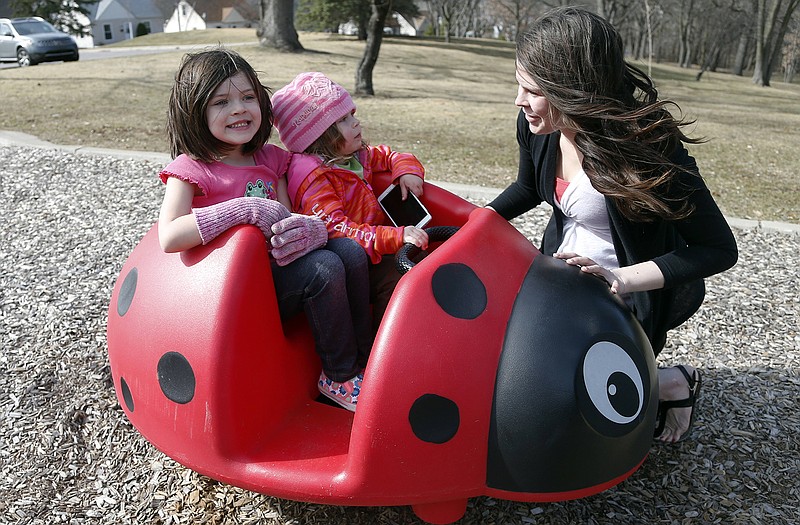A new national report places Missouri in the middle when it comes to child well-being.
The Kids Count Data Book, an annual report conducted by the Annie E. Casey Foundation, measures four indicators within four domains: economic well-being, education, health and family and community. After crunching the numbers, Missouri placed 26th overall - a number Missouri Kids First Executive Director Joy Oesterly said is disappointing.
Children's well-being is a sign of how well the state is doing, she said, and based on the report, Missouri is an average state.
"I think children in Missouri deserve better," Oesterly said.
Missouri landed in the 26th spot last in 2012, and stayed in the mid-to-upper 20s since. Before 2012, the Show-Me State ranked in the 30s, and at 34th overall in 2007 and 2011.
Missouri's ranking improved three spots from last year, but the time frame is not long enough to be a true sign of positive change, said Heather Lockard, Missouri Community Action Network's executive director. Assessing a three-year window gives a clearer picture, she added, and because Missouri ranks the same as it did in 2012, there has been little to no change.
Lockard said data shows an increase in the working poor statistics. According to CAN data, 29.5 percent of Missouri jobs are considered low wage - 3.6 percent more than in 2014.
"Although there was an increase in employment (in Missouri), we know too many jobs are low wage and are not enough to support a family's expenses," she said.
The Kids Count report shows there are 304,000 Missouri children living in poverty, and 30 percent of children have parents with unsecure employment. Nationally, 1.7 million more children are living in low-income working families than during the Great Recession. Poverty, Lockard said, highly impacts children's three basic development factors: relationships, learning resources and stress. By alleviating poverty early in life, a child can better develop, she said.
To help children in poverty, Lockard said there needs to be more funding toward social service programs dedicated to finding solutions and providing resources. Specifically, Lockard said the Head Start program, which provides a preschool education to low-income families, is an essential to ensure kindergarten readiness. Of the state's 3-5 year olds, 56 percent are not attending preschool.
The education indicators remained steady from 2014. Missouri ranked 23rd in education, with 65 percent of fourth-graders not proficient in reading, 67 percent of eighth-graders not proficient in math and 14 percent of high school students not graduating on time.
When analyzing the report, Missouri State Teachers Association spokesman Todd Fuller said the numbers indicate teachers are making schools a "stable and consistent" environment. Many indicators slightly worsened from the prior year, but education factors stayed the same. As children face increased challenges in health, poverty and home life, teachers take on a greater responsibility in ensuring children meet their educational goals, Fuller said. The numbers show, he added, that teachers fare rising to the occasion.
"When children have to focus on external factors - what am I going to eat tonight, are my parents going to be home tonight or are they working, where will we be living - then the idea of focusing on education seems so distant," he said.
Oesterly said Missouri children's health care needs are underserved. Seven percent of Missouri children live without health insurance, according to the report.
Of Missouri's four domain results, health scored the worst with a ranking of 33. Oesterly said children are most in need of mental health services, which she added are sporadic throughout the state.
Political contentions hurt children's health, she said, adding that debates over Medicaid and other health care issues have caused a divisiveness, resulting in Missouri's children not receiving quality care. In terms of mental health, adults are given priority over children, she said, citing funding for evidence-based treatments in children is lower than adults.
In order to improve all aspects, Oesterly said she would like to see a single organization formed to tackle all the needs of a child.
"Children's needs are much more comprehensive," she said.
Child well-being ranking indicators, percentages
Economic Well-Being
Children in poverty, 22 percent
Parents lack secure employment, 30 percent
Households with a high housing cost burden, 30 percent
Teens not in school and not working, 7 percent
Education
Children not attending preschool, 56 percent
Fourth-graders not proficient in reading, 65 percent
Eighth-graders not proficient in math, 67 percent
High school students not graduating on time, 14 percent
Health
Low-birthweight, 8 percent
Children without health insurance, 7 percent

